WATER AND SANITATION SERVICES - FINANCING THE UNDERSERVED TARGET COMMUNITIES IN RURAL KENYA
Which Areas Does the Water and Sanitation Services Focus On?
The Water and Sanitation Services (WSS) department is established to enable the development of water services in rural areas considered not to be commercially viable as stipulated in the Water Act, 2016, Section 114 (b), (c). This department is responsible for the effective and efficient design and implementation of WSS programmes, including research activities, emergency and special programmes.
The key implementing agents for identified and approved water and sanitation projects are Water Service Providers (WSPs), Water Users Associations (WUAs), Conservancies, International and Non-Governmental Organisations (INGOs) who are involved in the preparation, planning, implementation and operations of water and sanitation projects. This Department relies upon outsourced support services from the private sector to offer technical support (in terms of ESIA, surveys and project designs). In addition, the County Governments co-finance some of the programmes, ensure coordination and play supervisory roles.
Projects funded under this Investment focus on the poor, underserved communities in Kenya who are viewed as financially unviable and unattractive to the traditional commercial-based service providers or licensees. It focuses on target areas that are water-stressed and that lack investment in water and sanitation facilities.
The WSS investment objectives are as follows:
- Finance to increase access to improved water and sanitation services in rural, underserved areas
- Enhance the capacities of implementing agents by providing technical, advisory and capacity development support
How Does WSS Work?
The WSS supports the County Governments towards increasing water and sanitation access in rural, underserved areas. This has been realised through the signing of Memoranda of Understanding and Implementing Partners’ financing contracts and financing prioritised projects.
The WSS financing mechanisms promote the definition of roles within the sector for good governance through independent oversight and monitoring of resource utilisation. This aspect ensures that fiduciary risks are minimised through effective and efficient monitoring mechanisms, leading to better implementation of water and sanitation projects with respect to value for money.
WaterFund has engaged the services of Quality Assurance Monitors (QAMs) who act as liaison officers and provide oversight, monitoring and quality assurance services.
Water and Sanitation Services Funding Process
WaterFund is a state corporation and mobilises funds from various development partners. The funds are then channelled to various county governments and organisations to support in project planning and implementation. This is done through calls for proposals, depending on the programme design.
WaterFund funding may be restricted and anchored to:
- Thematic focus – water, sanitation and climate change
- Selected counties or targeted communities
- Type of implementing partners
- Funding ceiling
- Project duration
The following figure shows the WSS funding process.
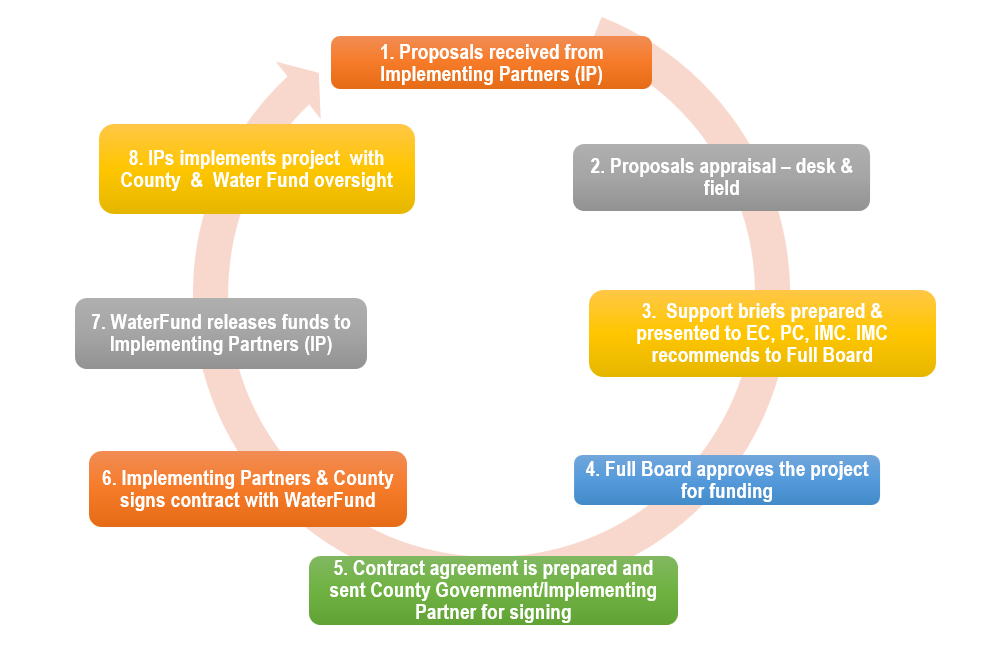
In general, projects will be identified through several schematic processes. However, this may vary according to the programme and the funding sources:
- Information campaign (subject to availability of funds) – advertisement for Call for Proposals will be done through widely circulated media and the WaterFund website. Time period would be provided for clarifications and/or public workshops to explain the proposal guidelines and eligibility criteria.
- Submission of a Proposal Applications – proposals will be received at the headquarters.
- Appraisal of proposal (governance, social, financial, environmental and technical). The appraisal will be twofold: desk and field. Desk appraisal against set appraisal criteria to check viability and appraise the supporting documents, timelines for submission, eligibility of applicants, proof of registration, amongst other requirements. Field appraisal entails assessing project relevance to the proposed community, technical, social and financial feasibility, environmental compliance, operation and maintenance, sustainability and impact and management and governance structures.
- Assessment of proposal after field appraisal (administrative and technical) – the selected projects may further be subjected to administrative and technical appraisal after field appraisal. Issues of concern are appropriateness and completeness of designs and bills of quantities, budgetary contribution, participation, operation and maintenance and sustainability.
- WaterFund four-tier approval process after development of an investment brief, it will be submitted to the Engineering Committee, Project Committee, Investment and Monitoring Committee, before being recommended to the Full Board.
- Full Board - The Board of Trustees make the final approval.
- Financing Contract/Agreement – Final stage includes signing of the Financing Agreement by the concerned parties and WaterFund.
- Capacity building – This involves training of the Implementing Partners on contract, financial, project and procurement management. Additional trainings, e.g., operation and maintenance, are scheduled as implementation progresses.
- Pre-launch & launch workshop – a participatory project launch is done where all project stakeholders are involved. Project information, including objectives, scope and budgets, is shared with the public.
- Project Implementation – Implementation of the project is conducted after identification of a contractor through a competitive process.
- Monitoring of project implementation.
- Internal and External audits are conducted.
- Completion certificates and final completion reports submitted by implementing agents to the Fund.
- Post-evaluation of projects.
- Evaluation of Programme (midterm and end term).
Funding Sources for the WSS Programmes
Since the inception of the WaterFund in 2004, the following Development Partners have supported the Department alongside the Government of Kenya namely: Government of Sweden (Sida), Government of Finland, Royal Danish Embassy/Danish International Development Agency (DANIDA), European Union (EU), African Development Bank (AfDB), United Nations International Children’s Emergency Fund (UNICEF) and World Bank (WB).
The Kenyan Government covers operational costs of the WaterFund, while the Development Partners funds are directed towards the project implementation activities.
Target Counties and Locations
The funding under the WSS programmes targets Counties based on two factors.
- County Selection Criteria that have been developed to identify the marginalised counties based on the following indices:
- KNBS information on poverty, water and sanitation coverage.
- WASREB data on WSPs.
- WRA information on catchments their status and numbers of WRUAs.
- WaterFund analysis of past investments.
- Development partner priorities for marginalised counties e.g. funding targeting Arid and Semi-Arid Land (ASAL) Counties.
The wound-up and ongoing programme under the WSS Investment targeted 20 Counties based on available funding. These programmes are as follows:
- Kenya Water Supply Programme (KWSP)
- Medium Term ASAL Programme (MTAP) I and II
- Drought Emergency Response Programme (DERP)
- European Union – Support for Horn of Africa (EU SHARE)
- The current Sustainable Management and Access to Water and Sanitation in the ASALs (SWASAP) covering six target counties
- Joint 6 Programme (J6P) - Kwale, Tharaka Nithi, Narok, Migori, Nandi and Laikipia Counties
- Green Growth & Employment Programme (GGEP)
- Water and Livelihood Programme (WLP)
Ongoing Programmes
- Sustainable Management and access to water and sanitation in the ASALs Programme (SWASAP) - Garissa, Isiolo, Lamu, Marsabit, Tana River, Turkana and Wajir Counties.
- Ending Drought Emergency - Climate Proofed Infrastructure Programme (EDE CPIRA) European Union (EU) support targeting Baringo, Kajiado, Kilifi, Kitui, Mandera, Samburu, Taita-Taveta and West Pokot Counties.
WaterFund continues to mobilise more funds and lobby the GoK to ensure that financing is available for more underserved areas and counties in Kenya.
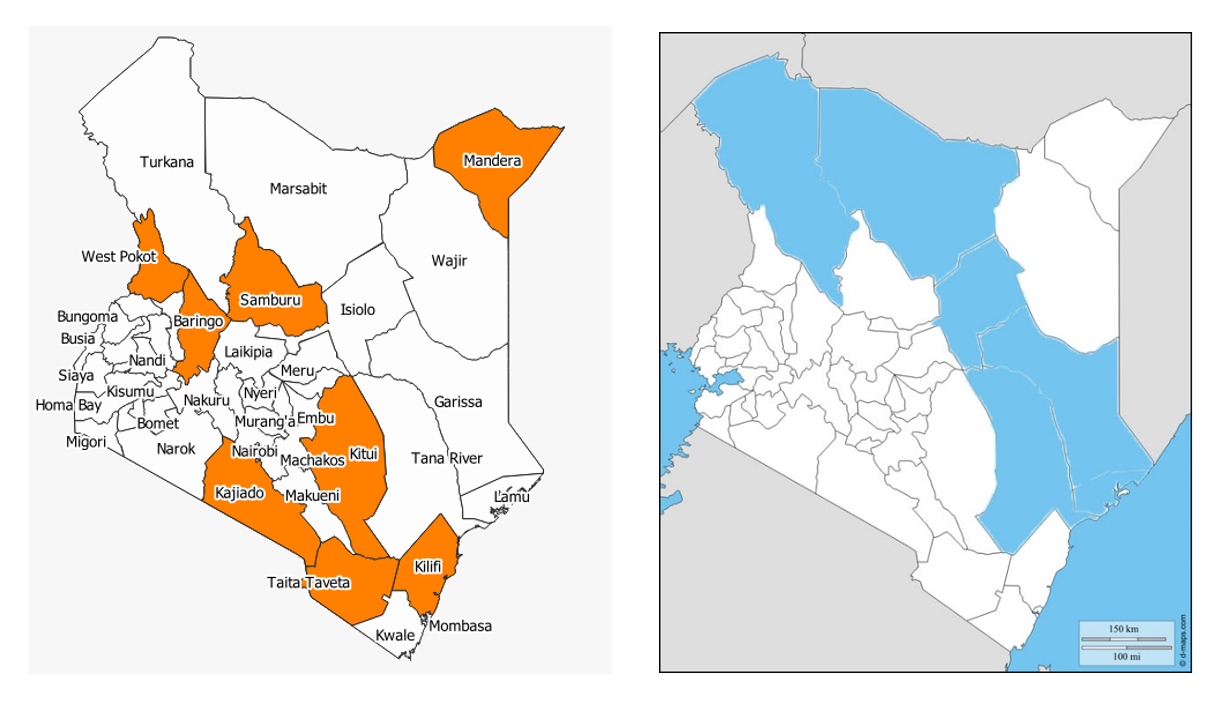
Map of Kenya showing WSS Locations
Achievements of the WSS Programmes
The WSS programmes to date have initiated projects worth KSh 3.74 billion, reaching a population of approximately 1.48 million people under the water and sanitation projects. In total, 386 water and sanitation projects have been funded.
| Programme | No. of Projects | Disbursement (KSh Millions) | Target Population | Funding Source |
| Water | 50 | 323 | 248,168 | GOS/GOF/GOK/EU/DANIDA |
| Sanitation | 36 | 26.98 | 37,050 | GOS/GOF/GOK/EU/DANIDA |
Impact of the WSS Programmes on the Rural Communities
The intervention by the WSS programmes in the underserved and marginalised areas has yielded positive results, as highlighted below:
- Capacity building of sub-grantees, INGOs, WSPs, WUAs and Conservancies on contract, financial and project management, procurement procedures, O&M training.
- Reduced waterborne diseases
- Reduced long trekking distances while searching and fetching water
- Improved and increased water access for humans and livestock
- Improved institutional and community sanitation
- Improved institutional hygiene
WSS Department Financing Principles
The Water and Sanitation Services Department's success is based on several factors:
- Transparent selection of communities/ water utilities, targeting the poorest communities in Kenya.
- Gender Equality and Social Inclusion during planning, implementation and management of water and sanitation projects.
- Climate-proofing infrastructure for resilience and to mitigate against climate change effects.
- Promotion of self-reliance and poverty alleviation to beneficiary communities.
- Support towards community capacity development in the management and operations of water and sanitation.
- Participation, good governance and transparency enhancing accountability.
- County Government engagement and involvement to enhance the sustainability of investments.
Cross-cutting Issues
HIV/AIDS
In the Water and Sanitation Services, emphasis is placed on sensitisation and supporting the affected and infected persons in the community through ensuring they have access to clean water to assist in improving their health status. It is also through the sharing of information and linkages to institutions supporting the affected and infected. Training manuals have been produced for the implementers to sensitise and involve affected persons in the planning and siting of water and sanitation interventions. Brochures from the National AIDS Control Council are also circulated to the beneficiaries during project launch and commissioning. The implementers adhere to the National AIDS Policy.
Gender Equality and Social Inclusion (GESI)
The Water and Sanitation Department is working towards realising gender equality and social inclusion in its programmes. The integration of equity is a critical component in water and sanitation programmes since it gives value to socio-economic differences and diversity. WaterFund advocates for 1/3 gender representation at all decision-making levels and 1/5 inclusion of Persons with Disability and involvement of youth and the aged in all sections of project implementation. This is part of the government's policy to empower the marginalised communities.
Environmental Sustainability
Consideration for climate change effects during planning and designs of projects by promoting adoption of green technologies such as gravity supplies, use of solar and wind power energy for pumping schemes; development of climate-proofed infrastructure – water storage facilities such as water pans, djabias, berkads, rain water harvesting tanks and using technology e.g. smart meters and leakage detection to improve water use efficiency and reduced non-revenue water.
Pictorials
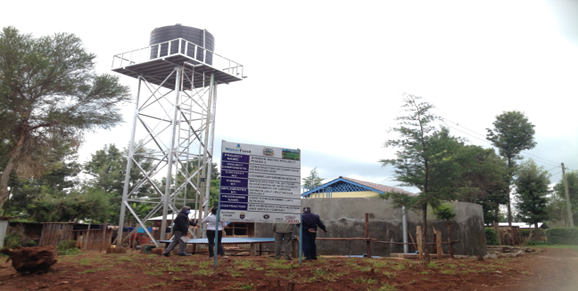
Composite filtration unit (CFU) in Sirimon water project, Laikipia County
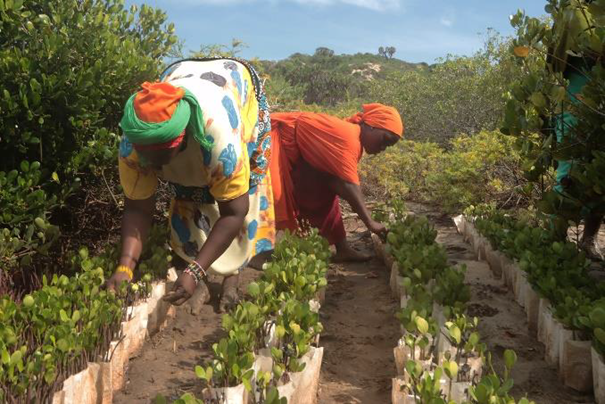
Mangrove restoration in Lamu County
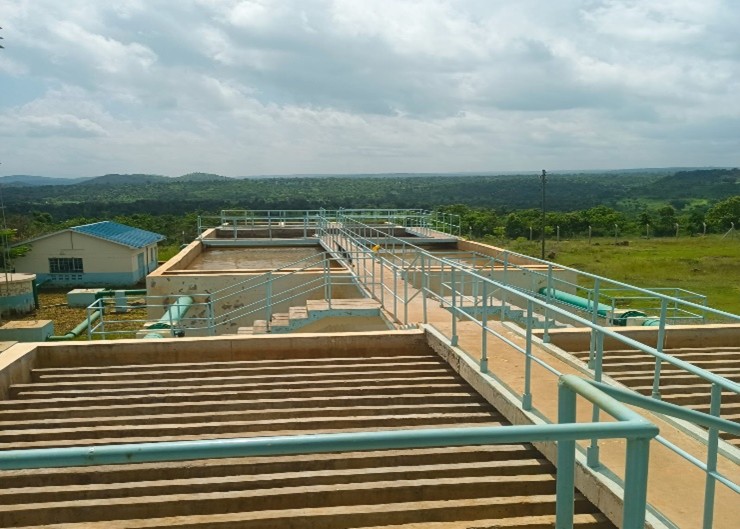
Kathwana water project treatment works in Tharaka Nithi County
> For success stories on our Programmes, including Water and Sanitation Services / Rural Programmes, explore our stories here
